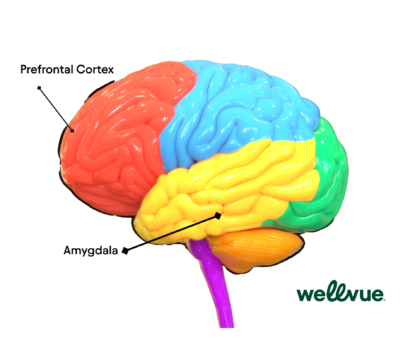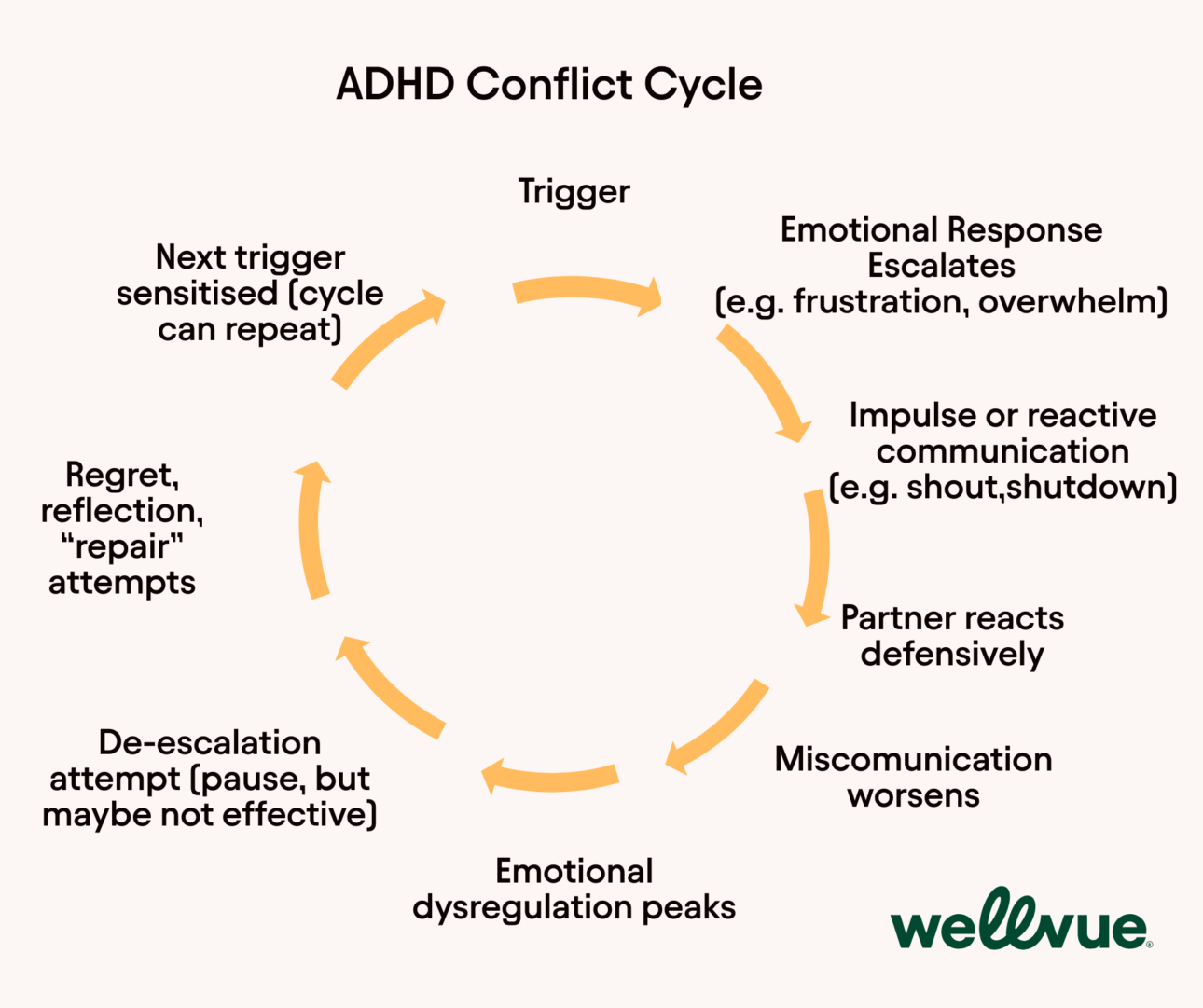Staying Connected During Conflict: ADHD, Dysregulation, and Relationship Resilience
By Brenda Taylor, Clinical Psychologist, MPsych, MAAPI
Conflict is a natural part of any relationship. For individuals with ADHD, staying emotionally regulated during an argument can feel like navigating a storm. It can also feel like the arguments and patterns just keep repeating without getting resolved. The result is that there is a lot of shame and guilt afterwards and nothing feels resolved.
I have noticed over the years of counselling and coaching clients, that apart from organisation, motivation, time blindness and other daily struggles, managing relationships can be another facet that some ADHDer’s really struggle with in their daily life. Not everyone with ADHD will struggle, but it can be harder for those that struggle with emotional dysregulation or maintain relationships. This can be romantic relationships, but you might also find it applies to your friendships, colleagues at work, parent-child relationships, in fact any relationship.
There are many reactions a person can have in an argument. For some they can be explosive and aggressive, but for many they also find that they internalise and then shut down. Both reactions can cause difficulties. When a person is on the more explosive side, especially when heated, it can lead to impulsive reactions, miscommunication, and disconnection. On the flip side of that when a person internalises and avoids arguments, it means carrying the conflict and things are never resolved.
However, with the right tools and understanding, it is possible to stay connected even in the heat of disagreement. This article explores practical strategies to manage dysregulation during conflict, supported by neuroscience and psychological insights. Whether you are navigating romantic relationships, friendships, or professional interactions, these tools can help foster empathy, clarity, and connection.
Childhood Foundations- back to the beginning
Let’s start by exploring some of the developmental reasons that mean that people with ADHD may experience more relationship issues. It can start in childhood with patterns formed in the family, at school and with friends. These are like scripts or expectations that we form around relationships. Past experiences colour what we expect to happen in relationships, and often we unconsciously play out dynamics that we have learnt early in life. For example, if you expect people to embarrass you when you say what you think, then you might become avoidant about speaking your mind.
Think about the scenario of being in school and having the experience of speaking up in class only to be told you had the wrong answer, or having someone laugh at you. If that happened to you a few times, or maybe only even once, part of your mind now has an expectation that it might happen anytime you speak up or give an opinion, so a script is formed. This most likely will affect your expectation of what will happen and could make you want to avoid that feeling again, so you avoid speaking up in many situations, even though you are not in that actual classroom anymore. It’s like our brain takes these experiences and stores them a script of how we think things will go. On some level it feels better to avoid the possibility of being embarrassed when speaking up.
Additionally, studies have shown that children with ADHD often struggle with peer relationships, emotional self-regulation, irritability and social reciprocity. These early difficulties can set the stage for later interpersonal challenges. One such study which followed children over the course of 18 months (Johns-Mead et al., 2024) found that ADHD showed elevated irritability, emotional, and peer difficulties when compared to a control group. This is also another factor that might lead to difficulties in regulating in an emotional situation.
There is in fact a lot of research to support these social and emotional difficulties, and the idea is not to you bore you here with endless research. However, it sets the scene that as adult, especially without intervention in childhood, these early relational patterns can influence how individuals with ADHD perceive and respond to conflict in adulthood. This can mean maladaptive coping strategies, such as avoidance, defensiveness, or emotional reactivity.
Understanding Dysregulation and ADHD
ADHD is often associated with difficulties in attention and hyperactivity, but emotional regulation is a lesser known yet equally impactful aspect. Emotional dysregulation refers to the inability to manage emotional responses appropriately. For individuals with ADHD, this can manifest as:
-
Intense emotional reactions
-
Difficulty calming down
-
Impulsivity in speech or behaviour
-
Trouble focusing during emotional stress
Understanding the Neuroscience of Dysregulation
Prefrontal Cortex and Amygdala: The Emotional Circuit
Research shows that individuals with ADHD often have differences in brain regions responsible for emotional regulation, particularly the prefrontal cortex and amygdala. The prefrontal cortex governs executive functions like impulse control and decision-making and may be underactive. Meanwhile, the amygdala, which processes emotional stimuli, can become hyperactive, leading to heightened emotional responses.
Why Emotional Control Feels Harder with ADHD
This imbalance can make it harder to pause, reflect, and respond thoughtfully during conflict. Understanding this neurological basis is empowering. Dysregulation is not a character flaw but a brain-based challenge, that with the right tools, understanding and support, you can learn to manage the right strategies.

The prefrontal cortex and amygdala play key roles in emotional regulation challenges common in ADHD and relationships.
When emotional regulation breaks down, conflict can follow a predictable pattern. Understanding this “ADHD conflict cycle” helps couples notice early signs, pause before reacting, and rebuild connection more effectively.
ADHD Conflict Cycle

Understanding the ADHD conflict cycle helps couples recognise emotional triggers and build more connected communication patterns.
Strategies to Stay Connected During Conflict
There are things you can lean to help you manage conflict. By recognising what is happening in your mind and body when you feel in conflict, you can use techniques to help you slow things down so that you are not reacting out of the old patterns, or the same old scripts of childhood. The idea is to take things like automatic reactions that are less conscious and make them conscious.
Recognise Early Signs of Dysregulation
Self-awareness is the cornerstone of emotional regulation. You can learn to identify your early warning signs such as racing thoughts, rapid heartbeat, or difficulty concentrating or other signs and signals your body sends you when you start to face a conflict. These signals indicate that your nervous system is entering a dysregulated state also known as the fight, fight or freeze response.
Looking at neuroscience, it’s our brain’s interoceptive system helps us sense internal bodily states. Learning to notice your body and what you feel leading up to an argument and being able to notice it helping to train your self-awareness which gives you the ability to then notice what is happening so you can improve emotional awareness and regulation.
Take a Pause and Reset
When dysregulation hits, pausing is powerful. Politely request a break from the conversation to collect your thoughts. This is not avoidance, but a proactive step to prevent escalation. This might look like saying something about what you are feeling, and while you want to come back to the conversation later, you just need to take a break in this moment. This also lets the other person know you are not just avoiding a conflict or are dismissive but just need to take a pause to gather your thoughts and calm down a bit.
Let your partner know you are feeling dysregulated. Use simple, honest language such as “I’m overwhelmed right now and need a moment.” This transparency fosters empathy and prevents misinterpretation.
Also by pausing activates the parasympathetic nervous system, which calms the body and reduces the fight-or-flight response triggered by the amygdala.
Practice Mindfulness and Grounding
Grounding exercises like deep breathing, counting, or focusing on a sensory object can help bring you back to the present moment. These techniques regulate the nervous system and reduce emotional intensity. There are many ways to practice mindfulness, it doesn’t just have to be sitting still in a room with no thoughts, in fact that would be extremely difficult. Mindfulness can be about learning to tune inwards to what you are feeling, it can also be tuning outwards on something like music. A large aspect of mindfulness is learning to train your attention and concentration on something rather than letting your mind roam everywhere. That can be a big ask, but with practice it can be very effective. In terms of how it affects the brain, mindfulness increases activity in the anterior cingulate cortex, which plays a role in attention and emotional regulation.
Identify Triggers and Reflect Together
After calming down, reflect on what triggered your dysregulation. Was it a tone of voice, a specific word, or a feeling of being misunderstood? Understanding your triggers helps you become a better communicator and avoid future pitfalls. If you are not sure perhaps keeping a journal might help or talking about it in therapy. After the conflict, reflect on what worked and what did not. Discuss with your partner how to improve future interactions. This builds emotional intelligence and strengthens the relationship and promotes understanding each other.
Set Healthy Boundaries
Establish clear boundaries for conflict discussions. Agree on signals for taking breaks and commit to revisiting the conversation when both parties are calm. By having some predictability and structure, this can reduce activation of the limbic system, which governs emotional reactivity.
Setting boundaries also means that it helps to make sure you have rules for fighting fair, such as staying on topic, not bringing up old issues that have nothing to do with the current issue. This keeps the discussion on track, respectful and fair.
Seek Professional Support
Therapists trained in ADHD and relationship dynamics can offer tailored strategies and mediate difficult conversations. Therapy provides a safe space to explore emotional patterns and build communication skills. While a lot of work can be done through reflection, therapy can really help with uncovering some of those automatic or unconscious patterns, and then learn how to reshape, them, respond to them differently and to find healthy ways of relating in our lives.
Building Relationship Resilience
Conflict doesn’t have to weaken a relationship. With understanding and consistency, it can actually strengthen your connection.
Communication Tips for ADHD Couples
-
Use timeouts wisely: Take short breaks when emotions escalate to avoid saying things impulsively.
-
Name the emotion, not the person: Try “I feel overwhelmed” instead of “You’re stressing me out.”
-
Use visual reminders: Notes, shared calendars, or communication apps can help track conversations and commitments.
-
Check in daily: Brief “connection check-ins” reduce misunderstandings and increase emotional awareness.
-
Use empathy first: ADHD-related forgetfulness or distractibility isn’t lack of care, it’s neurological, not intentional.
When to Consider ADHD relationship Therapy
-
You feel stuck in repeating conflict cycles.
-
Emotional outbursts or shutdowns are impacting daily life.
-
One or both partners feel unheard or misunderstood.
-
You want to learn new ways to communicate calmly and effectively.
-
You’d like a professional to help reframe patterns and improve emotional
Final Thoughts
Staying connected during conflict when you have ADHD is not about perfection. Emotional dysregulation is a real and valid challenge, but with awareness, communication, and compassion, it can be navigated successfully.
Relationships thrive not because conflict is absent, but because both partners are willing to stay present, listen, and grow together. By implementing these neuroscience-backed strategies, you can transform moments of tension into opportunities for deeper connection and more importantly, a better life.
If you’d like support managing ADHD and relationship challenges, Wellvue’s clinicians offer online counselling and ADHD therapy Australia-wide.

